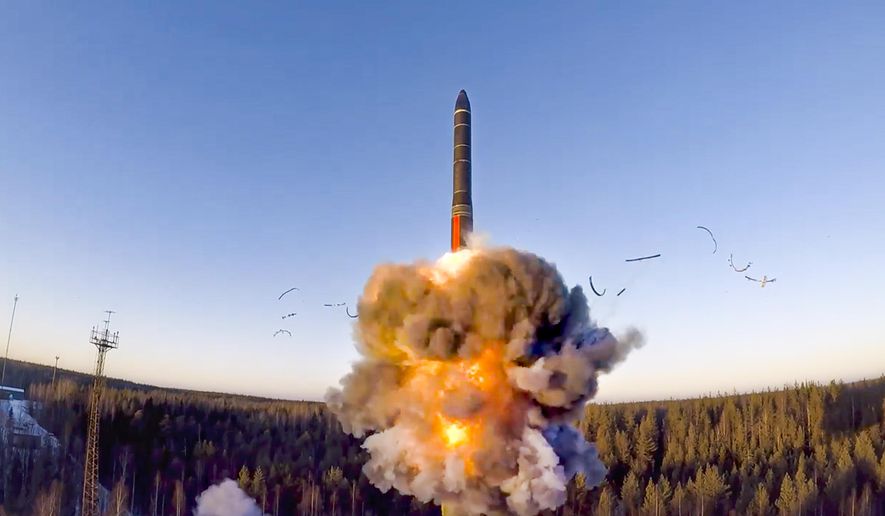Russian arms inspections under the New START arms accord were halted by the Biden administration Thursday in response to Moscow’s suspension of the treaty, the State Department said.
The countermeasures to the Russian suspension of the treaty were outlined in a department fact sheet that asserted that the steps are reversible and that the government is committed to mutual implementation of the treaty.
Russian President Vladimir Putin announced in February that his government is ending adherence to the provisions of the 2010 treaty that limited both the U.S. and Russia to 1,550 deployed warheads.
Moscow was notified of the action earlier.
“The United States remains ready to work constructively with Russia on resuming implementation of the New START Treaty,” the department said in announcing the countermeasures that it said were legal under international law.
“International law permits such measures in order to induce a state to return to compliance with its international obligations,” the statement said.
The four countermeasures include the U.S. decision not to provide Russia with a twice-yearly update on treaty-limited forces after the Russians failed to provide their data by March 30.
The databases included information on treaty-accountable nuclear facilities and forces, including numbers of deployed warheads and delivery vehicles.
Despite the decision not to provide the data, the State Department on May 15 released its numbers as of March.
The data shows 1,389 deployed warheads, 665 deployed land-based missiles, sea-based missiles and heavy bombers, and 800 nondeployed launchers and bombers.
Russian arms were listed as 1,458 deployed warheads, 527 deployed launchers and bombers, and 742 nondeployed launchers and bombers.
A State Department report on arms compliance made public last year reported that Russian warhead deployments may exceed the 1,550-warhead limit under the treaty.
Starting Thursday, the U.S. government will no longer supply Russia with treaty-required notifications on missiles and launchers.
“Russia ceased fulfilling its notification obligation upon its purported suspension of the treaty on February 28, 2023,” the statement said. “The fundamental purpose of the majority of notifications is to improve each side’s ability to verify the other’s compliance with the treaty, especially in combination with on-site inspections.”
Notification on intercontinental ballistic missile launches and submarine missile launches will continue to be provided to Moscow.
On inspection activities, Russia will no longer be permitted to conduct treaty inspections in the U.S. The action involves revoking visas for inspectors and air crews and denying pending visa applications. Diplomatic clearance for inspections also was halted.
Russia has not conducted an inspection since at least June 2022 and has denied U.S. inspections in Russia since August when an inspection team was turned back, the statement said.
The last inspection notification by Russia was in 2020.
The countermeasures also will deny Russia missile telemetry data that is sent electronically from launched missiles to ground stations to test reliability and capabilities.
New START requires that both nations exchange missile telemetry data each year from land- and sea-based launches.
“The treaty does not require the United States to take such unilateral action in any event, since it calls for an exchange of telemetric information on an agreed number of launches,” the statement said.
• Bill Gertz can be reached at bgertz@washingtontimes.com.




Please read our comment policy before commenting.